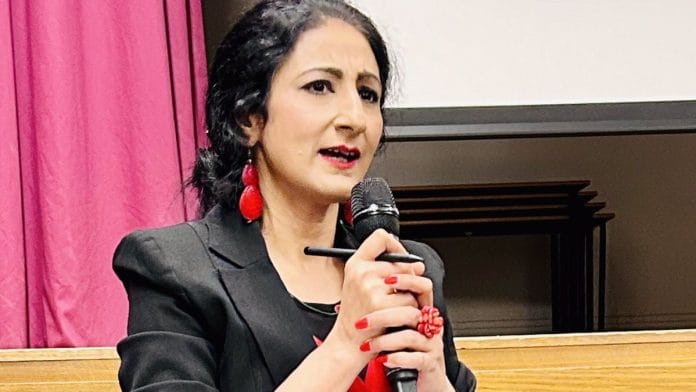New Delhi: Nitasha Kaul has hit back at the government’s decision to cancel her Overseas Citizenship of India registration. “It’s intimidation in order to silence,” the Indian origin, United Kingdom-based academic and author told ThePrint.
Kaul, a professor of Politics, International Relations, and Critical Interdisciplinary Studies at the University of Westminster in London, received the notice on a busy Sunday while reviewing articles and reading thesis submissions. Her OCI registration was cancelled due to the ““anti-India activities” she allegedly perpetrated through her “writing, speeches, and journalistic activities at various international forums and social media platforms”. Kaul shared the cancellation notice on X.
“It’s impossible to know why this has happened, but going after academics like this reeks of insecurity,” she told ThePrint over the phone.
Know that arresting academics in #India for speaking against hate is closely tied to removing access to country & family for academics outside India.
Idea is to send a signal — don’t dare challenge us within & don’t dare analyse what’s going on to convey to audiences outside. https://t.co/Gn4DgZRBH2
— Professor Nitasha Kaul, PhD (@NitashaKaul) May 18, 2025
Two days after the Pahalgam terror attack, Kaul, a Kashmiri pandit, wrote an article for The Conversation, which analysed the region’s complex politics. She was also featured on Al Jazeera, but the interview has been removed from YouTube India.
“Important questions need to be answered. What were the lapses in security and who is responsible? What are the policy failures in Jammu and Kashmir that allowed this to happen? Who in government should be accountable and what lessons can we take from the attack?” she wrote in her article for The Conversation.
Kaul appears to be dogged, unyielding in her pursuit of research and academic expression. She also mentioned the case of Ashoka University professor Ali Khan Mahmudabad, currently in custody of the Haryana police. Mahmudabad was arrested after a Bharatiya Janata Party (BJP) youth leader filed a complaint over his social media post, which analysed “the optics” of Operation Sindoor.
“No system is perfect. If a democracy is acting authoritarian, I am duty bound as an academic to say that it’s no good for those who are experiencing it either directly or indirectly,” Kaul said.
Not her first run-in
Nitasha Kaul writes regularly on matters of human-rights violations in Kashmir. She was even a key witness before the US House Committee on Foreign Affairs in 2019, where she testified on human rights violations in the state following the abrogation of Article 370.
This isn’t Kaul’s first run-in with the government. Last year, she was stopped from attending an academic conference on the Constitution hosted by the Karnataka government in Bengaluru, despite, at the time, having a valid OCI card.
Over the past few weeks, Kaul has spoken against media censorship, the mass blocking of X accounts, and the brutal online bullying of foreign secretary Vikram Misri – all while voicing her concern for the people of Jammu and Kashmir.
Called a “jihadi bride” and told to apply for Pakistani citizenship, Kaul has been subjected to a volley of abuse on social media.
Up until the events of 2024, when she was prevented from entering Bengaluru due to a directive “from the top,” Kaul was a frequent visitor to India. She was born in Gorakhpur and studied at the Shri Ram School of Commerce (SRCC) in New Delhi, before migrating to the UK in 1997. Her mother still lives in India. Kaul refused to divulge the name of the city, though, citing fears of doxxing. Previously, while her mother was undergoing surgery, her address was leaked on social media.
“There’s a thousand textures in which you belong to your country. It’s impossible to explain the feeling,” she said. “I’m not talking Srinagar or Delhi. I’m talking about the country as a whole.”
Also read:
‘Acting in absurd hope’
Pushparaj Deshpande, among the organisers of the Bengaluru conference that Kaul was banned from attending, said that her body of work is “worth paying attention to.”
“She focuses on the empowerment of vulnerable sections of society, including Kashmiri Pandit human rights and democracy,” he said. “She’s represented her university and India on various international fora. People may disagree with her statements, but in the national interest, we must engage with all views, as the Karnataka government tried to do.”
Following the 2024 incident, Kaul wrote a 20,000-word rejoinder to the central government. In response, the government “repeated the same assertions,” she claimed.
“I was acting in the absurd hope of anyone actually reading,” Kaul said. “This is a good tool for them (the government). Not everyone wants to go through this on a regular basis.”
(Edited by Zoya Bhatti)







Ms. Antara Baruah seems to be itching to jump in and fight on behalf of anti-Hindu and anti-India elements of all hues and shades. Her articles on The Print clearly depict her as a wannabe member of the liberal-secular cabal. Hope her desperate acts actually earn her the much coveted membership of this cabal.